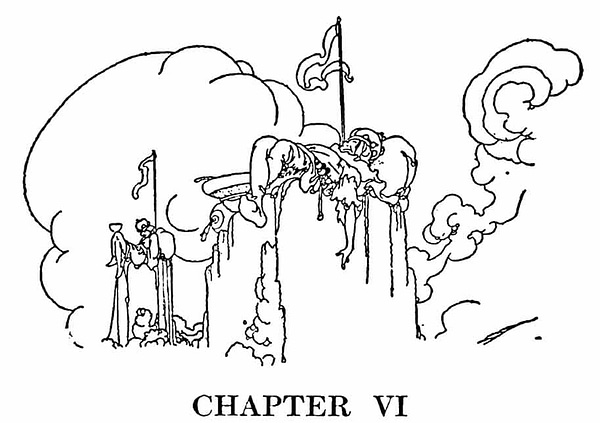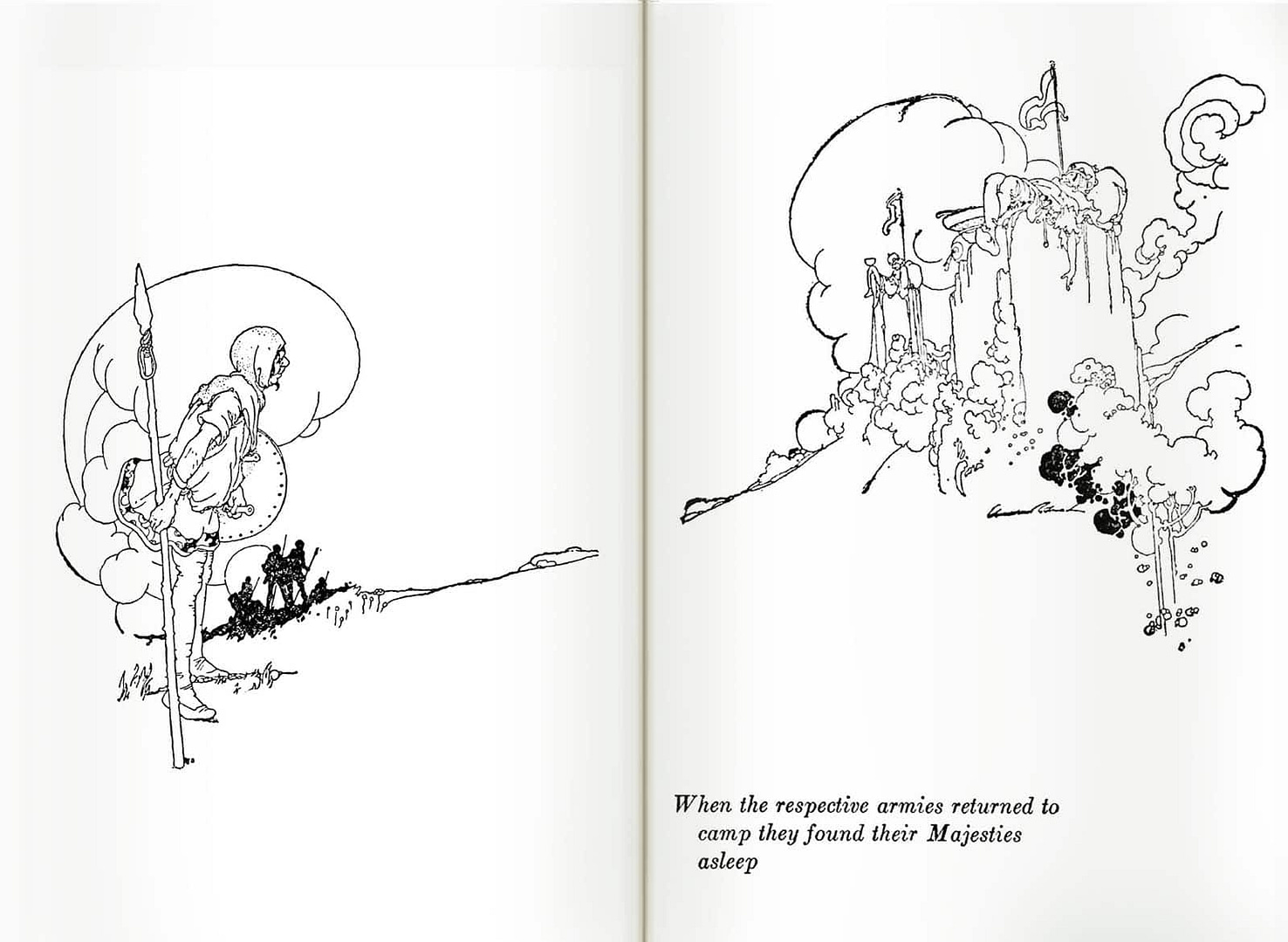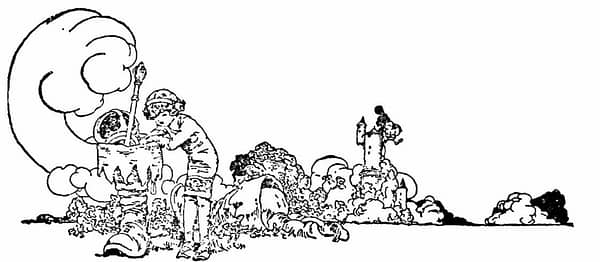 Meanwhile “the King of Euralia was prosecuting the war with utmost vigour.”
Meanwhile “the King of Euralia was prosecuting the war with utmost vigour.”
So says Roger in that famous chapter of his, and certainly Merriwig was very busy.
On the declaration of war the Euralian forces, in accordance with custom, had marched into Barodia. However hot ran the passion between them, the two Kings always preserved the elementary courtesies of war. The last battle had taken place in Euralian territory; this time, therefore, Barodia was the scene of the conflict. To Barodia, then, King Merriwig had led his army. Suitable pasture land had been allotted them as a camping ground, and amid the cheers of the Barodian populace the Euralians made their simple preparations for the night.
The two armies had now been sitting opposite to each other for some weeks, but neither side had been idle. On the very first morning Merriwig had put on his Cloak of Darkness and gone to the enemy’s camp to explore the situation. Unfortunately the same idea had occurred at the same moment to the King of Barodia. He also had his Cloak of Darkness.
Half way across, to the utmost astonishment of both, the two Kings had come violently into contact. Realising that they had met some unprecedented enchantment, they had hurried home after the recoil to consult their respective Chancellors. The Chancellors could make nothing of it. They could only advise their Majesties to venture another attempt on the following morning.
“But by a different route,” said the Chancellors, “whereby the Magic Pillar shall be avoided.”
So by the more southerly path the two Kings ventured out next morning. Half way across there was another violent collision, and both Kings sat down suddenly to think it out.
“Wonder of wonders,” said Merriwig. “There is a magic wall stretching between the two armies.”
“He stood up and holding up his hand said impressively:
“Bo, boll, bill, bole.
Wo, woll——”
“Mystery of mysteries!” cried the King of Barodia. “It can——”
He stopped suddenly. Both Kings coughed. They were remembering with some shame their fright of yesterday.
“Who are you?” said the King of Barodia.
Merriwig saw that there was need to dissemble.
“His Majesty’s swineherd,” he said, in what he imagined might be a swineherd’s voice.
“Er—so am I,” said the King of Barodia, rather feebly.
There was obviously nothing for it but for them to discuss swine.
Merriwig was comfortably ignorant of the subject. The King of Barodia knew rather less than that.
“Er—how many have you?” asked the latter.
“Seven thousand,” said Merriwig at random.
“Er—so have I,” said the King of Barodia, still more feebly.
“Couples,” explained Merriwig.
“Mine are ones,” said the King of Barodia, determined to be independent at last.
Each King was surprised to find how easy it was to talk to an expert on his own subject. The King of Barodia, indeed, began to feel reckless.
“Well,” he said, “I must be getting back. It’s—er—milking time.”
“So must I,” said Merriwig. “By the way,” he added, “what do you feed yours on?”
The King of Barodia was not quite sure if it was apple sauce or not. He decided that perhaps it wasn’t.
“That’s a secret,” he said darkly. “Been handed down from generation to generation.”
Merriwig could think of nothing better to say to this than “Ah!” He said it very impressively, and with a word of farewell returned to his camp.
He was in brilliant form over the wassail bowl that night as he drew a picture of his triumphant dissimulation. It is only fair to say that the King of Barodia was in brilliant form too. . . .
For several weeks after this the battle raged. Sometimes the whole Euralian army would line up outside its camp and call upon the Barodians to fight; at other times the Barodian army would form fours in full view of the Euralians in the hope of provoking a conflict. At intervals the two Chancellors would look up old spells, scour the country for wizards, or send each other insulting messages. At the end of a month it was difficult to say which side had obtained the advantage.
A little hill surmounted by a single tree lay half way between the two camps. Thither one fine morning came the two Kings and the two Chancellors on bloody business bent. (The phrase is Roger’s.) Their object was nothing less than to arrange that personal fight between the two monarchs which was always a feature of Barodo-Euralian warfare. The two Kings having shaken hands, their Chancellors proceeded to settle the details.
“I suppose,” said the Chancellor of Barodia, “that your Majesties will wish to fight with swords?”
“Certainly,” said the King of Barodia promptly; so promptly that Merriwig felt certain that he had a Magic Sword too.
“Cloaks of Darkness are not allowed, of course,” said the Chancellor of Euralia.
“Why, have you got one?” said each King quickly to the other.
Merriwig was the first to recover himself.
“I have one—naturally,” he said. “It’s a curious thing that the only one of my subjects who has one is my—er—swineherd.”
“That’s funny,” said the King of Barodia. “My swineherd has one too.”
“Of course,” said Merriwig, “they are almost a necessity to swineherding.”
“Particularly in the milking season,” said the King of Barodia.
They looked at each other with added respect. Not many Kings in those days had the technicalities of such a humble trade at their fingers’ ends.
The Chancellor of Barodia has been referring to the precedents.
“It was after the famous conflict between the two grandfathers of your Majesties that the use of the Magic Cloak in personal combats was discontinued.”
“Great-grandfathers,” said the Chancellor of Euralia.
“Grandfathers, I think.”
“Great-grandfathers, if I am not mistaken.”
Their tempers were rising rapidly, and the Chancellor of Barodia was just about to give the Chancellor of Euralia a push when Merriwig intervened.
“Never mind about that,” he said impatiently. “Tell us what happened when our—our ancestors fought.”
“It happened in this way, your Majesty. Your Majesty’s grandfather——”
“Great-grandfather,” said a small voice.
The Chancellor cast one bitter look at his opponent and went on:
“The ancestors of your two Majesties arranged to settle the war of that period by personal combat. The two armies were drawn up in full array. In front of them the two monarchs shook hands. Drawing their swords and casting their Magic Cloaks around them, they——”
“Well?” said Merriwig eagerly.
“It is rather a painful story, your Majesty.”
“Go on, I shan’t mind.”
“Well, your Majesty, drawing their swords and casting their Magic Cloaks around them they—h’r’m—returned to the wassail bowl.”
“Dear, dear,” said Merriwig.
“When the respective armies, who had been waiting eagerly the whole of the afternoon for some result of the combat, returned to camp, they found their Majesties——”
“Asleep,” said the Chancellor of Euralia hastily.
“Asleep,” agreed the Chancellor of Barodia. “The excuse of their two Majesties that they had suddenly forgotten the day, though naturally accepted at the time, was deemed inadequate by later historians.” (By Roger and myself, anyway.)
Some further details were discussed, and then the conference closed. The great fight was fixed for the following morning.
The day broke fine. At an early hour Merriwig was up and practising thrusts upon a suspended pillow. At intervals he would consult a little book entitled Sword Play for Sovereigns, and then return to his pillow. At breakfast he was nervous but talkative. After breakfast he wrote a tender letter to Hyacinth and a still more tender one to the Countess Belvane, and burnt them. He repeated his little rhyme, “Bo, Boll, Bill, Bole,” several times to himself until he was word perfect. It was just possible that it might be useful. His last thoughts as he rode on to the field were of his great-grandfather. Without admiring him, he quite saw his point.
The fight was a brilliant one. First Merriwig aimed a blow at the King of Barodia’s head which the latter parried. Then the King of Barodia aimed a blow at his adversary’s head which Merriwig parried. This went on three or four times, and then Merriwig put into practice a remarkable trick which the Captain of his Bodyguard had taught him. It was his turn to parry, but instead of doing this, he struck again at his opponent’s head; and if the latter in sheer surprise had not stumbled and fallen, there might have been a very serious ending to the affair.
Noon found them still at it; cut and parry, cut and parry; at each stroke the opposing armies roared their applause. When darkness put an end to the conflict, honours were evenly divided.
It was a stiff but proud King of Euralia who received the congratulations of his subjects that night; so proud that he had to pour out his heart to somebody. He wrote to his daughter.
“MY DEAR HYACINTH,
“You will be glad to hear that your father is going on well and that Euralia is as determined as ever to uphold its honour and dignity. To-day I fought the King of Barodia, and considering that, most unfairly, he was using a Magic Sword, I think I may say that I did well. The Countess Belvane will be interested to hear that I made 4,638 strokes at my opponent and parried 4,637 strokes from him. This is good for a man of my age. Do you remember that magic ointment my aunt used to give me? Have we any of it left?
“I played a very clever trick the other day by pretending to be a swineherd. I talked to a real one I met for quite a long time about swine without his suspecting me. The Countess might be interested to hear this. It would have been very awkward for me if it had been found out who I was.
“I hope you are getting along all right. Do you consult the Countess Belvane at all? I think she would be able to advise you in any difficulties. A young girl needs a guiding hand, and I think the Countess would be able to advise you in any difficulties. Do you consult her at all?
“I am afraid this is going to be a long war. There doesn’t seem to be a wizard in the country at all, and without one it is a little difficult to know how to go on. I say my spell every now and then—you remember the one:
‘Bo, boll, bill bole.
Wo, woll, will, wole. ‘
and it certainly keeps off dragons, but we don’t seem to get any nearer defeating the enemy’s army. You might tell the Countess Belvane that about my spell; she would be interested.
“To-morrow I go on with my fight with the King of Barodia. I feel quite confident now that I can hold him. He parries well, but his cutting is not very good. I am glad the Countess found my sword for me; tell her that it has been most useful.
“I must now close as I must go to bed so as to be ready for my fight to-morrow. Good-bye, dear. I am always,
“YOUR LOVING FATHER.
“P.S.—I hope you are not finding your position too difficult. If you are in any difficulties you should consult the Countess Belvane. I think she would be able to advise you. Don’t forget about that ointment. Perhaps the Countess might know about some other kind. It’s for stiffness. I am afraid this is going to be a long war.”
The King sealed up the letter and despatched it by special messenger the next morning. It came to Hyacinth at a critical moment. We shall see in the next chapter what effect it had upon her.

